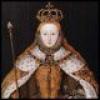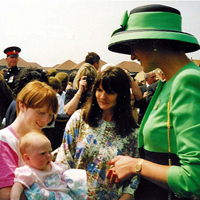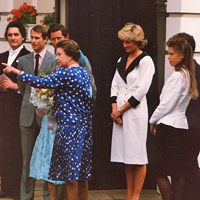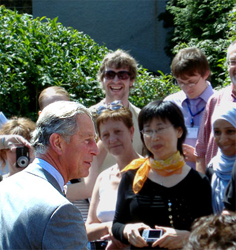- Home
- Monarchy Today
- Can This Monarchy Be Saved?
Can This Monarchy Be Saved?
- By Dana Duke
- Published 05/14/2008
- Monarchy Today
Dana Duke

Dana Duke is a corporate trainer living in New York with interests in Europe, royalty, reading, and biking. Her username at TRF is ysbel.
View all articles by Dana DukeA Dangerous Legacy
During the Inquest into Diana’s death, each day saw new revelations of the things that Diana had told friends, some contradictory, some simply unbelievable. A Coroner’s inquest, with its legal implications, is no place for the heart. Only facts and evidence are welcome in those hallowed halls of justice, and the hearts of those who were affected by this tragedy had to wait outside until the order of business was done. Against the cold light of justice, the friends in whom Diana confided didn't hold up to severe scrutiny, neither their motives, their actions, nor their words. The more their stories and their words filled the airwaves, the harder it was to conjure the fairytale image of Diana as the Queen of People’s Hearts rather than the more seedy image of Diana sitting in consultation with characters who increasingly resembled the evil stepmother (Simone Simmons) and the hunchbacked henchman (Paul Burrell). One protests rather feebly how sad was it that Diana was so deceived by everybody in her life, and to be sure, the princess in the fairytale trusted in one person who deceived her in the end - but a fairytale princess whom everybody deceives and mistreats? Even in fairytales, that is a harder tale to swallow. So, as the number of people who apparently deceived and used Diana kept increasing, it's not surprising that some people asked themselves, Was it actually we the public who was deceived rather than Diana? Thus, we are left at the end of an epic battle where nobody comes out a winner, and after all the hearts and minds that were involved in this battle, it seems a bitter disappointment. What went wrong?

 I think what happened is that the Queen and the royal family forgot that their first order of business - nay, their reason for being - lay in remaining first and foremost in the people’s hearts. When the British papers were first criticized for pushing Diana-mania to its extremes, they responded that in 1979 the Queen would make state visits to other countries and there was so little public interest that their papers couldn’t justify paying for the plane tickets to cover the affair. This was a problem whose gravity a lot of people, including myself, underestimated at the time. However, if people didn’t care what the Queen did, then her rationale for being was slipping. This holds true for Charles and the other royals as well. They didn’t realize that they had to find their own way to matter to their people and make a difference. The royal family had always been in it for the long haul, whereas the popular press is only interested in what sells papers today. That is the way things should be; however, on a more basic level, if at any point if one Briton can say that the royal family is not important or not worth caring about, the royal family is in a bad position. One sign of this is when people start to grumble about misuse of taxpayers' money. When citizens grumble about wasting taxpayer money, it is like employees complaining about their salaries; what they're really saying is, "Give me a reason to care about this so I don't have to grumble about the money." Prince Philip saw that in the beginning; that's why he called the family the Firm and treated it like a business. However, as he was getting older and his life drew nearer to its close, he quite understandably focused on the personal relationships he cared about, like his marriage to the Queen. One saw this in the last years of another great royal, the Queen Mother, as her focus on the afterlife becomes more important than acclaim and her reputation in this life.
I think what happened is that the Queen and the royal family forgot that their first order of business - nay, their reason for being - lay in remaining first and foremost in the people’s hearts. When the British papers were first criticized for pushing Diana-mania to its extremes, they responded that in 1979 the Queen would make state visits to other countries and there was so little public interest that their papers couldn’t justify paying for the plane tickets to cover the affair. This was a problem whose gravity a lot of people, including myself, underestimated at the time. However, if people didn’t care what the Queen did, then her rationale for being was slipping. This holds true for Charles and the other royals as well. They didn’t realize that they had to find their own way to matter to their people and make a difference. The royal family had always been in it for the long haul, whereas the popular press is only interested in what sells papers today. That is the way things should be; however, on a more basic level, if at any point if one Briton can say that the royal family is not important or not worth caring about, the royal family is in a bad position. One sign of this is when people start to grumble about misuse of taxpayers' money. When citizens grumble about wasting taxpayer money, it is like employees complaining about their salaries; what they're really saying is, "Give me a reason to care about this so I don't have to grumble about the money." Prince Philip saw that in the beginning; that's why he called the family the Firm and treated it like a business. However, as he was getting older and his life drew nearer to its close, he quite understandably focused on the personal relationships he cared about, like his marriage to the Queen. One saw this in the last years of another great royal, the Queen Mother, as her focus on the afterlife becomes more important than acclaim and her reputation in this life.
The second mistake that they made was when they realized that they needed someone and they tried to import a new member of the family to further the fairytale and be someone that people would care about. Diana gave the people the fairytale, someone to delight in and someone to get excited about; however, if this excitement and caring was not there for the original family members, then in the end they were going to lose. There are some things that the royal family could easily import, such as sophistication, style, and a modern outlook, but caring and devotion had to always be resident in the original royal family. Or, at least, the royal family had to have something that made the people care for them. It didn’t matter what it was, even if it was something totally different than what Diana had, but they had to have something which made them first in people’s hearts. They had had it once with the Queen and the Queen Mother and the identity that people had had with Queen Mary and King George, and they wanted a bit of this caring to come back again. So in one sense, it's fair to say that the royal family missed the boat whereas Diana caught it, regardless of whether we think that Diana made good use of her good fortune.
In that same Ladies' Home Journal where I got my monthly dose of royal comings and goings, the magazine held a regular feature, "Can This Marriage Be Saved?" A marriage therapist would interview a husband and wife whose marriage was on the skids. I think it would be interesting to have an article like this for the royal family. I don’t have the answers to those questions, but I think I have part of the answer. The royals have to bring back something that will make the British people care about them again. It doesn’t have to be the spirit of Diana, but it has to be something that people care about and identify with. The Queen can definitely use this herself, but her reign is on its downside; she’s already reigned for 56 years and she’s not going to be on the throne for 56 more. Charles is the one who needs this. No matter what he’s done or what he plans to do, I think he’s got to find a way to make the people care about him again and want to defend him. As far as approval for Camilla, I think he will be in a better position and I think the monarchy will be more stable if she can be crowned Queen with public acclamation. However, I think Camilla’s public acceptance is less important than Charles’. It may be difficult, but it isn't totally impossible. One only need to look back at Henry VIII and his extraordinary rebound into public affections after casting off the popular Queen Catherine of Aragon and bastardizing his daughter Mary. Anne Boleyn was universally hated, and at one point the King was so hated that assassination plots were uncovered and rebellions to overthrow him in favor of his and Catherine’s daughter Mary (hmm, any resemblance to the murmurings of people wanting William to take the throne in place of his father?). However, even in Anne’s lifetime, the King was able to get back his amazing popularity with the people. One contemporary chronicler noted that when Anne was pregnant, the King went out in a public square and received silence from the masses, a sign of the public’s disapproval of his treatment of Catherine of Aragon. The King made a small joke that he’d heard Englishmen were fools but he’d never had the opportunity to judge the fact for himself. The crowd laughed, and the chronicler noted that during the course of the afternoon the crowd noticeably warmed to him. Henry VIII could be cruel - he set up his best friend, Sir Thomas More, to be publicly tried and beheaded for standing in the way of his divorce, and one of his first acts as King was to order the execution of two of his father’s accountants because they had kept the books that had kept him from his father’s money. He was capricious, sensitive, easy to find fault, easy to take offense, and easy quick to strike out at those who he thought were against him. However, despite all this, he was able to keep the hearts of the English people to the end, a trait that was inherited by his younger daughter, Elizabeth I. Not all monarchs had this ability, but in this day and age when kings and queens have no power, all that is left for them to find their path to people’s hearts.
King in People's Hearts
Can Charles do this? Yes, I believe so. Will he do this? I don’t know. It depends on what he wants. If he wants to have influence in people’s minds, as he mostly certainly does in his many beliefs and causes, he will first need to carve out a space in their hearts. As we have seen, it is possible. Only a few years before Diana came on the scene, a British songwriter and singer, Greg Lake, released the song "I Believe in Father Christmas." In the song, he sang about his childhood Christmases and sang of the dreams he had as a child. In the cynical 1970s in the post-Vietnam War era in the me-decade, people became disenfranchised, disillusioned, and cynical with their lives and their world. They stopped believing in fairytales because, as Greg Lake sang,
And I believed in Father Christmas
I looked to the skies
Then I woke with a yawn in the first crack of dawn
And I saw him and saw through his disguise
There was real anger in his voice as he sang
They sold me a dream of Christmas
They sold me a Silent Night
They sold me a fairy story
Till I believed in the Israelite
They said there'd be snow on Christmas
They said there'd be peace on Earth
The anger against the Establishment that gave him the fairytale to believe in lingered long after his eyes were opened. Yet in the music in the background, you can hear a children's choir and a guitar softly strumming just as we imagined the church it sounded the first time the hymn Silent Night was played in a church with a broken organ. We got a feeling that despite his anger, what Greg Lake wanted most of all was to believe in Father Christmas again or to just believe in some magic again. It was as if he were singing, "Give me something to believe in." I believe that's where the people were when Diana came on the scene: the royal family no longer seemed to inspire or to offer a dream to believe in. People were dissatisfied with their jobs, their partners, their families, their lives. Divorces were happening at a higher rate, and, to quote Shakespeare, how weary, stale, flat and unprofitable seemed to us all the uses of this world!. Diana came along with a freshness and a delight and interest in all around her. She seemed to adore her new husband, delight in the public's acclaim, be devoted to her own family, and greet each new day and each person with the delight of a child opening a new present on Christmas Day. She seemed to find a joy in everything and everyone around her, and that joy was infectious.
We now know that this simple joy and delight was an illusion. Diana, even at the young age of 19, was desperately unhappy, angry with her family for her traumatic childhood, angry with the Establishment that allowed her family to mistreat her, insanely jealous of anyone who was more loved than she was, and vengeful against those she felt she'd done wrong. But we didn't know that at the time. All we saw was the delight of a young girl for whom the world seemed her oyster with lots of glittering pearls to be had. That's what the British people want now - they want something or someone to believe in - and that person can be you, Charles.
 Don't worry about people not forgiving you about Diana; if anything, that history has shown is that the people have an amazing capacity to forgive. Don't worry that you do not have youth on your side any more. When your parents married, the majority of the population was under 40 and people didn't live much past the age that your grandfather died at 56. Right now, advertisers who are most in tune with the emotions of the times are saying that 60 is the new 40, so you've got a lot of contemporaries who have been on this planet for over 50 years and expect to be around a lot longer. The baby boomers are still the largest population segment in the world, and what excites someone at 20 is not necessarily the same thing that catches the dreams of someone at 60. What they share, though, is the capacity and need to dream. But right now, people are growing cynical again. They're finding fault with their politicians, their governments, their lives, much in the same way they fell disillusioned in the 1970s. And now you are at a point where you still have a lot of time to connect with the people. Let them connect with you. I know you are used to people deferring to you, but you don't need to be right all the time and you don't need to appear that you know all the answers. You also don't have to give your most mentally challenged subjects the impression that you are exercising extreme patience by suffering their company. You can let the people teach you a thing or two and use your position not to highlight yourself but to highlight the great things about the British nation. You can show a boy's delight in the people, places, and things you come across meet as you go about your travels, and you can seek to share meaningful experiences with your subjects. It's great that you're happy with Camilla by your side, but try to be happy with just yourself no matter where you are and who you are with, and let that show.
Don't worry about people not forgiving you about Diana; if anything, that history has shown is that the people have an amazing capacity to forgive. Don't worry that you do not have youth on your side any more. When your parents married, the majority of the population was under 40 and people didn't live much past the age that your grandfather died at 56. Right now, advertisers who are most in tune with the emotions of the times are saying that 60 is the new 40, so you've got a lot of contemporaries who have been on this planet for over 50 years and expect to be around a lot longer. The baby boomers are still the largest population segment in the world, and what excites someone at 20 is not necessarily the same thing that catches the dreams of someone at 60. What they share, though, is the capacity and need to dream. But right now, people are growing cynical again. They're finding fault with their politicians, their governments, their lives, much in the same way they fell disillusioned in the 1970s. And now you are at a point where you still have a lot of time to connect with the people. Let them connect with you. I know you are used to people deferring to you, but you don't need to be right all the time and you don't need to appear that you know all the answers. You also don't have to give your most mentally challenged subjects the impression that you are exercising extreme patience by suffering their company. You can let the people teach you a thing or two and use your position not to highlight yourself but to highlight the great things about the British nation. You can show a boy's delight in the people, places, and things you come across meet as you go about your travels, and you can seek to share meaningful experiences with your subjects. It's great that you're happy with Camilla by your side, but try to be happy with just yourself no matter where you are and who you are with, and let that show.
While no one would ever want to go through the hell that you went through with Diana, take this opportunity to separate yourself from the flesh-and-blood woman that Diana was, who doubtless drove you to madness at times with her own particular brand of madness, jealousy, hurt, and vengefulness, and try to connect to the person not as she was but as the person that she wanted to become. She wanted to care about people, to love them, to delight in them - she wanted a fairytale to believe in. Find that joy, that desire to be better than yourself, dare to dream, and in doing so you will find your own fairytale to believe in.
The last time the people were looking for a fairytale, you tried to give people a virgin bride. We know how that ended - not too well. Now is your opportunity again to get people excited about following you.
Photo Credits
Page 1: Photo of newspaper headline of The Glums (Charles and Diana in South Korea in November 1992) taken by Flickr member Mig_R and used with permission.
Page 1: "Sorrow for an angel" (photo of floral tributes to Diana on the 10th anniversary of her death) taken by DeviantArt member alireza1 and used with permission.
Page 2: Photo of Diana surrounded by an admiring crowd at Canterbury 1995 taken by Flickr member Nostalgic T+ Allan and used with permission.
Page 2: Photo of Diana standing apart from the royal family on the Queen Mother's birthday in 1987 taken by Flickr member WhiteGoldWielder and used with permission.
Page 2: Photo of Charles greeting the public at Glamorgan in 2007 taken by Flickr member Federhirn and used with permission.
